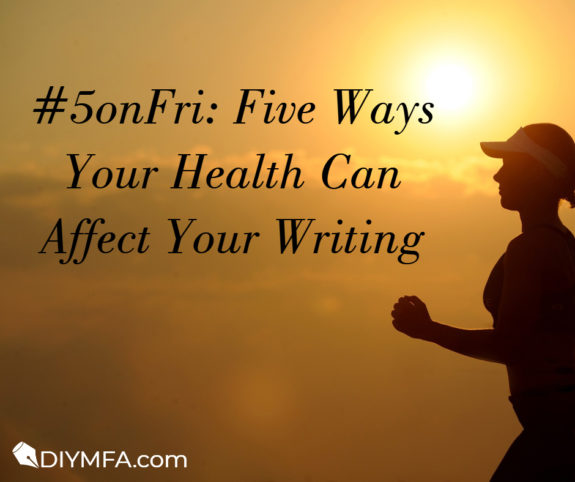If the world is lacking anything, it certainly isn’t health advice. Consumers are constantly bombarded with tips for eating right and living an active lifestyle. As writers, we have some unique physical concerns to watch out for. Hours in front of the computer can strain eyes, fatigue wrists and hands, and wreak havoc on our posture. In return, pain and other symptoms could get in the way of our creativity and writing time.
Anti-glare glasses will protect your vision, ergonomic keyboards will keep arthritis at bay, and lumbar support will straighten your spine, but there are a myriad of other body parts that contribute to your literary masterpiece. In order to craft the best book possible, keep a watch on these as well!
1) Ears
Whether you’re listening to the latest audiobook, your favorite Gabriela Pereira podcast episode, or a little music to set the mood as you write, you need to be thinking about the health of your ears. The intensity of a sound wave is measured in decibels (dB). Sounds below 85dB are considered safe while anything over 120dB can result in irreversible hearing damage in as little as an hour and 15 minutes. Due to the logarithmic way decibels are calculated, 120dB is not 120x louder than 1dB, it is 1012 or over a billion times louder.
Just as your eyes need a break from the computer screen every 20 minutes, so too do your ears need a rest. Even low sounds played for an extended duration can wreck eardrums. Take active steps to protect your hearing. Switch from earbuds to over-the-ear headphones; it can reduce sound by up to 9dB without sacrificing quality. Turning the volume down on phones, TVs, and stereos will avoid future damage so that you can keep typing away to your favorite jams without straining to hear them.
2) Feet
Everything that writing requires seems to be on the upper half of your body, so why think about something as far away as your feet? Sitting for long periods of time can result in swelling and numbness of the legs. If your chair is too high, it causes your feet to dangle, putting pressure on the back of the thighs, which inhibits blood flow and results in edema (swelling). This same pressure impinges nerve signals, causing the feeling of your limbs going to sleep.
Luckily, there are some simple steps (yes, pun totally intended) you can take to protect your tootsies. Adjust your chair so that your feet rest flat on the floor and don’t forget to get up and move every so often to promote good circulation. Whether you’re at your standing desk finishing that next chapter or rubbing elbows with literary giants at a writing conference, be sure to opt for practical footwear. Avoid the temptation to work at home barefoot, in socks only, or in unsupportive footwear like slippers. Foot pain can distract you from important tasks or put a damper on a fun event. Your shoes aren’t going to land you a book deal, but your ideas are. Keep yourself happy and free from foot pain.
3) Butt
This is a body part often taken for granted, but it’s probably one of the most important things we possess. If you’ve been noticing a little less shape to your derrière or you have pain in your butt and tailbone when you get up after a marathon of writing, you need to do something about it.
When you sit, the gluteal muscles are not engaged. The longer and more frequently you remain sitting, the lazier your muscles become and the less shape they hold. Prolonged sitting also tilts the hip flexors forward, exaggerating the flattened appearance of your butt.
It isn’t just the shape of your tush that suffers from long hours at your desk. The gluteus maximus, the largest muscle in the body, is responsible for holding your spine and core straight and keeping your hips level. If you lack strength in your butt, other muscles must compensate, resulting in low back, hip, or leg pain. The only way to counteract this is to exercise your butt and core regularly and maintain good posture as you sit.
4) Stomach
I have never been one to miss a meal, but every once in a while I tell myself I’ll eat something after this next paragraph and two hours later I still have not moved from my desk. Controlling your blood sugar and eating healthy foods at regular intervals is important for focus, energy, and overall health. A poor diet could be affecting your writing more than you know.
Although it is more common in diabetics, hypoglycemia, dangerously low blood sugar, can happen to anyone. Your brain consumes half of the body’s glucose; without this power source, you will experience nausea, anxiety, lightheadedness, shakiness, excess sweating, and mental confusion. We may playfully call this “being hangry,” but in fact, you are experiencing a serious medical issue. Writing requires focus and a steady hand to type. If you let your blood sugar spike or drop to dangerous levels, your novel will suffer for it.
5) Brain
Your mind is where the story begins, so keeping a healthy and well functioning brain is imperative to producing a good book. Alongside meditation and a nutritious diet, the best thing we can do for our brains is sleep. If you are a busy professional, parent, athlete, etc, you might be tempted to sacrifice sleep for a little more writing time. Don’t!
During periods of slow wave sleep, your brain increases activity. Memories, information, and ideas are absorbed and new electrical pathways are formed while the cobwebs are swept out and old pathways are broken. Quite literally, your brain is rewiring itself. Instead of wasting precious time puzzling over how to write yourself out of that plot hole, take a nap. You may find that your brain has formulated the perfect solution as you slept.
Being a good writer means also being a healthy one. Poor habits can result in mental cloudiness and physical pain, which can get in the way of any novelist’s dreams. Pay attention to your body and take care of yourself. Your book is counting on it.

Jeanette is a scuba diving instructor living in landlocked Dallas, TX. Oh… she also does freelance blogging and editing, makes a lot of dad jokes, creates web content, supports the oxford comma, and writes the occasional piece of fiction.
She is the editor of a career exploration guide available on Amazon and has a lot of files on her laptop that may one day be published. Until that happens, you can visit her #WordyWednesday blog for a mid-week word fact or look at pictures of her cats on Instagram and Facebook.







